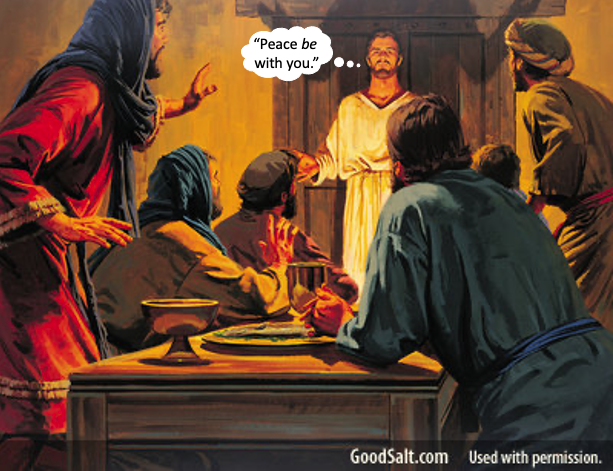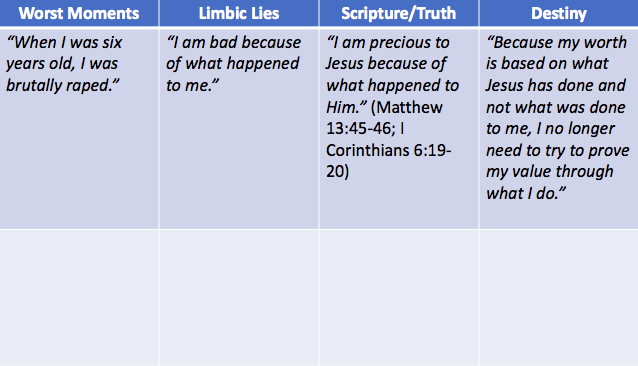“And when he saw that, he arose and ran for his life, and went to Beersheba, which belongs to Judah, and left his servant there.” I Kings 19:3
An intriguing illustration begins with an ad announcing that the devil has put some of his tools up for sale. On the day of the sale, the tools were placed out for public inspection. Each tool had its price tag. Everyone recognized what a terrible collection it was – hatred, envy, jealousy, deceit, lying, pride, etc. But laid aside from the rest was the highest priced tool, appearing harmless though well-worn. Someone asked, “What is the name of that tool?” The devil replied, “That is discouragement.” The man asked, “Why is it priced so high?” To this question the devil admitted it was because it was more useful to him than all the others. Why, he could pry open and enter a person’s heart with that tool when others had failed. It was badly worn because he used it so frequently on everyone, and few people knew it belonged to him.
Discouragement is a great tool of the devil. We must do battle with it in our lives and in the lives of those around us. But how? To discover some ways to climb out of the pit of discouragement we will take a look at I Kings 19.
King Ahab and his wife Jezebel were ruling over Israel at the time. Since Ahab treated Jezebel more like a mother than a wife, he always sought her stamp of approval. Jezebel introduced Baal worship (false god) to God’s people. As a result, there was a huge spiritual decline in the nation of Israel. So, God sent a spiritual heart surgeon – the prophet Elijah. Elijah invited Ahab and four hundred fifty Baal priests to a little barbeque on Mt. Carmel. Both Elijah and the priests built altars and asked for a match from heaven.The altar of Baal was left to rot with not even a spark. But Elijah’s dirt, rocks, wood and water were all consumed by fire from heaven. Onlookers were very impressed with the God of Israel, but they were depressed with Baal priests. Elijah slaughtered four hundred fifty Baal priests that day. Surely, back in Jezreel, King Ahab would set Jezebel straight as to the true God. Right? They would be ready for a revival? Right? Wrong!!
The Bible tells us, “1 And Ahab told Jezebel all that Elijah had done, also how he had executed all the prophets with the sword. 2 Then Jezebel sent a messenger to Elijah, saying, ‘So let the gods do to me, and more also, if I do not make your life as the life of one of them by tomorrow about this time.’ ” (I Kings 19:1-2). Although God was using Elijah to bring about a great spiritual awakening in the nation of Israel, there was one person who hated God’s prophet. Queen Jezebel could not stand him partly because he had so much influence. She was furious and sends a message to Elijah, “If I don’t kill you within twenty-four hours, I will be ready to kill myself.”
Jezebel’s resistance causes Elijah to get deeply discouraged. “3 And when he saw that, he arose and ran for his life, and went to Beersheba, which belongs to Judah, and left his servant there. 4 But he himself went a day’s journey into the wilderness, and came and sat down under a broom tree. And he prayed that he might die, and said, ‘It is enough! Now, Lord, take my life, for I am no better than my fathers!’ ” (I Kings 19:3-4). God has been using this prophet in miraculous ways the last three years, and now, when one homicidal woman threatens his life, he gets scared and runs into the desert and prays that he might die. He has gone from the mountain top of victory to the bottom of the pit of discouragement. He was so discouraged that he wanted to die.
But let’s not be too critical of Elijah because we are no different than God’s prophet. The Bible tells us, “Elijah was a man with a nature like ours.” (James 5:17). He had the same problems we do, and in this case he had a problem with discouragement. How does God bring Elijah (and us) out of the pit of discouragement?
The first way is to FOCUS ON THE FACTS, NOT YOUR FEELINGS (I Kings 19:3-4). “And when he saw that, he arose and ran for his life, and went to Beersheba, which belongs to Judah, and left his servant there.” (I Kings 19:3). God had just defeated four hundred fifty prophets of Baal through Elijah, and now he was afraid of a death threat from a self-seeking queen. Elijah’s fear made him run and he kept on running.
Fear can make us run too. We run to alcohol… an affair… food… a new job… busyness… video games… the computer… the tennis court, etc. Fear speeds us up instead of slowing us down. When we are driven by fear, it is difficult to turn off our thoughts. We may even skip meals or overspend. We cannot relax. Repetitive negative thoughts bombard us. We feel irritable and have dramatic mood swings. We find ourselves drinking too much caffeine or over-exercising. It is difficult to be alone or to be with people. We often make excuses for having to “do it all.” The most fearful people are often the most busy.
Elijah made the mistake of focusing on his feelings rather than on the facts. This often happens when we are discouraged. We focus on how we feel rather than on reality.Elijah felt like a failure because of one incident that scared him. He thought to himself, “I’m such a coward – I’m not worthy to live. I might as well crawl up in a corner and die.” So, because he felt like a failure he assumed he was a failure and he wants to avoid people so he left his servant in Beersheba and goes alone into the desert. When we isolate ourselves from other people and focus on our feelings, it is a recipe for discouragement. We lose perspective so quickly when we withdraw from people and wallow in our feelings.
We must remember that feelings are not facts. Therefore, they can be very unreliable. For example, I can wake up and not feel like a Christian. Does that mean I am not a Christian? No. Being a Christian is based on faith in the facts of God’s Word, not my feelings. Feelings often lie, so when we focus on our feelings rather than facts, we are going to get into trouble. Many psychologists believe that one key to health is to get your feelings out in the open. While we do need to identify and process our feelings, that is not the complete answer.
The Bible emphasizes that we need to get in touch with the truth rather than our feelings, because it is the truth that sets us free. Jesus said, “31 Then Jesus said to those Jews who believed Him, ‘If you abide in My word, you are My disciples indeed. 32 And you shall know the truth, and the truth shall make you free.’ ” (John 8:31-32). What is the opposite of truth? A lie. Satan often inserts lies into the limbic system of our (right) brains when trauma takes place in our lives. The limbic system is usually programmed by the time we are six years old. Our prefrontal cortex (our moral and impulse control system) of the (left) brain is not developed until we are twenty-five years of age. Over ninety-eight percent of the decisions we make in life are done subconsciously in the limbic system. So much of our lives are directed by patterns of the past.
Also, the limbic system is programmed to help us cope and survive, and coping behavior is at the core of avoiding our pain and fear. When we take sinful coping mechanisms and make them a lifestyle, we experience bondage to our fears.
People who are driven by fear often have wounds that were caused during childhood or adolescence that fuel their fears as adults. For example, when a six-year old boy is brutally raped and then threatened by his rapist, Satan can easily insert a lie associated with that intense trauma that says, “This happened to me because I am bad.” That little boy grows up believing this lie. At the core of his being he believes he is flawed and that no one could possibly love him if they knew him. The shame from this lie leads him to turn to unhealthy coping behaviors as an adult to numb the pain from his unresolved trauma.
Trauma comes in many forms and it can be experienced as a child and as an adult. High intensity trauma such as military combat, a natural disaster, physical or sexual abuse, the death of a family member, or divorce can leave deep wounds within one’s soul. But one does not have to experience intense trauma to struggle with shame-based lies and addictions. You may have experienced low intensity trauma that takes place frequently such as neglect, verbal rejection, minimal affection, teasing by a stepbrother, having few friends, etc. The cumulative effect of low intensity trauma can be just as damaging as high intensity trauma.
When Jesus said to those Jews who believed Him, “If you abide in My word, you are My disciples indeed. 32 And you shall know the truth, and the truth shall make you free.’ ” (John 8:31-32). To “abide” (menō) in Christ’s Word means “to continue or remain” in Jesus’ teaching – literally, “to make one’s home at.” Where we make our home is where we spend our time. The Jews knew a lot of Scripture, but they did not know the Author of the Scriptures. “Knowing the truth” means knowing Christ who is the truth (John 14:6; cf. 8:32, 36).
How do I abide in Christ’s Word? Early in my Christian life I learned a method of abiding in Christ’s Word that was primarily for my left brain, not my right brain or limbic system. That method basically focused on downloading biblical data into my left brain through reading, studying, and memorizing Scripture. But keep in mind that most of our decision making takes place in the right brain, albeit at an unconscious level. So if all I am doing is downloading Scripture into my left brain, I am going to experience little transformation. In the couple of years, I have learned a new method of abiding in Christ’s Word that is for both the left and right parts of the brain. This method involves an acrostic, S.W.O.R.D., from Seven Pillars of Freedom by Dr. Ted Roberts:
S – Scripture. For over twenty years, I have read through the entire Bible each year. I was so busy reading through my required passages to get through the Bible in a year, that it became another hurried thing I did in my busy schedule. But now, I approach God’s Word meditatively – not to analyze or criticize the Word, but to be analyzed and challenged by God’s Word. So first, I write God’s Word down on paper. Writing it down will help your thoughts to slow down and focus on the truth of the Scripture.
W – Wait. Read the Scripture again on your knees if possible. Read it aloud slowly and attentively. Then pause to let the passage sink in. Read the Scripture again, this time asking yourself the following questions, “What do I see? What do I hear? What do I feel? Where am I in this passage?” Finally read the passage again noticing what word or words grab your attention. Focus on those words. Chew on them for a few minutes. We have a tendency to intellectualize Scripture instead of experience God’s Word. During the waiting, we want to involve multiple senses – sight, hearing, feelings, touch, etc., to come to our observation about God, ourselves, and others.
O – Observe. Take a seat and write down what you observed in the Scripture. When we journal the Scriptures, we retain sixty percent more of what we learn. What truth do you discover in these verses? How does God see me and how do I see God and me? This will clarify your thought processes and involve another whole section of your brain.
R – Request that the Holy Spirit help you see how all of this applies to your life. This is not an academic process but a process of the heart. You are specifically asking the Word to analyze you instead of you analyzing the Word. This often triggers a neurochemical cascade of new understanding where your mind is being renewed.
D – Dedicate. What helps us from being just touched by God to being transformed is the commitment of our heart and will. Trying harder will not get us headed in the right direction when it comes to freedom from our fears. But once the Holy Spirit gets us headed in the right direction, dedicating ourselves to that direction in life will transform us.
We may avoid applying biblical truth because it is painful or difficult. Jesus said if you abide in His Word, “you shall know the truth, and the truth shall make you free.” (John 8:32). But at first, the truth may make you miserable! What is the opposite of truth? It is error or lies. God’s Word exposes the lies we believe that keep us enslaved to sin. The truth reveals our motives, points out our faults, rebukes our sin, and expects us to change. It is human nature to resist change, so applying God’s Word is hard work.
That is why I cannot stress enough the importance of being a part of a discipleship relationship with other believers. In fact, notice what Jesus said, “If you abide in My word, you are My disciples indeed.” (John 8:31b). The path to freedom from our fears is discipleship. We were wounded in the context of relationships, and we are healed in the context of relationships – healthy relationships. We always learn from others truths we would never learn on our own. Other people will help you see insights you would miss and help you apply God’s truth in a practical way. They can also help hold you accountable and I know I need that, don’t you?
The more we abide in Christ’s Word, the more we shall know the truth which can set us free from the lies that fuel our fears. You may have been through some terrible trauma that has left you deeply wounded. Your life may be driven by shame-based lies that drive your fears. You may have asked yourself, “Where was Jesus when this happened to me?” I want to encourage you, if you are a believer in Jesus, to invite Him to walk with you through that trauma. And as you do this, ask the Holy Spirit to help you answer the following questions:
– Where was Jesus when this happened to me?
– What look do I see on His face?
– And what truth would He say to me soon after this happened?
Christ cares for those who struggle with fears. I believe the more we encounter the radical love of Jesus Christ amidst our fears, the deeper His healing will be of our wounds. Healing that is based upon His truth. Getting the truth down into our souls is what brings change and freedom from our fears. Knowing the truth is not just a point of head knowledge; it is relational, it is intimate, and it is expressed through action.
Prayer: Heavenly Father, all of us can be like Elijah. By Your grace, we can have a mountaintop experience of victory, followed by opposition, and suddenly find ourselves running from our fears. Like Elijah, we can respond to our fears by speeding up and isolating ourselves from others. Please guide us in responding to our fears in a way that brings us back to You and the truth of Your Word. Thank You for reminding us that our feelings are not facts. They are simply feelings. They provide us with information, not instruction. Your Word gives us the instructions we need to identify our fears and past wounds that are often associated with them. Please reveal any lies that may be attached to our past wounds. Lord Jesus, since You are God, You are able to walk with us through those wounds and the lies associated with them. As You help us identify our feelings and any lies attached to them, please replace those lies with Your truth so we can overcome our fears. Regardless of how painful this process may be or how long it takes, we commit ourselves into Your loving hands. In Your mighty name we pray Lord Jesus. Amen.




